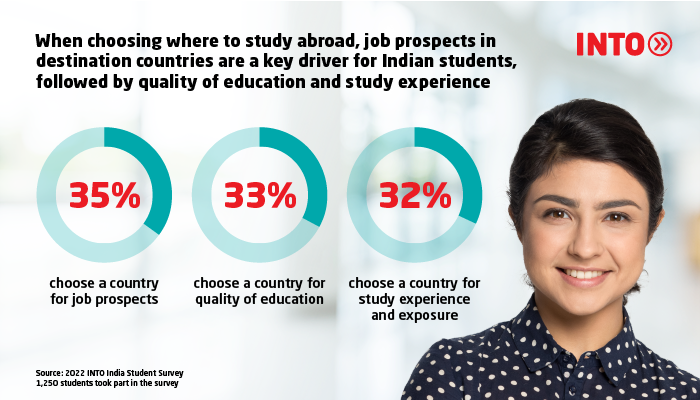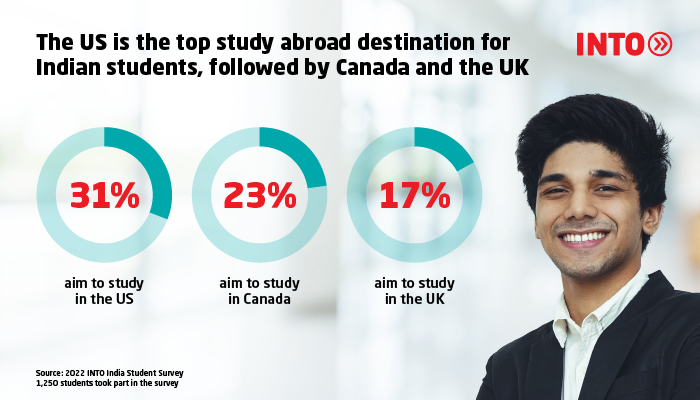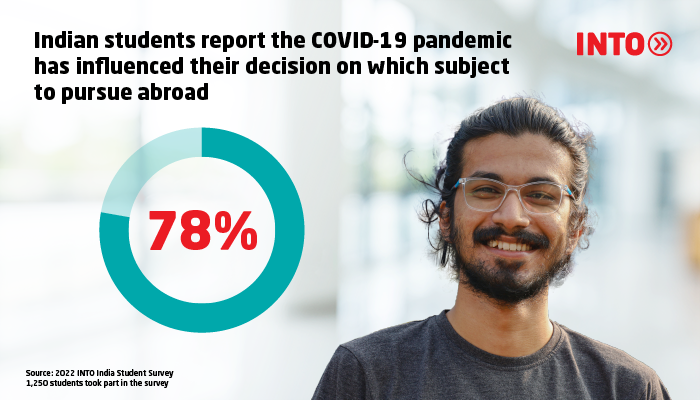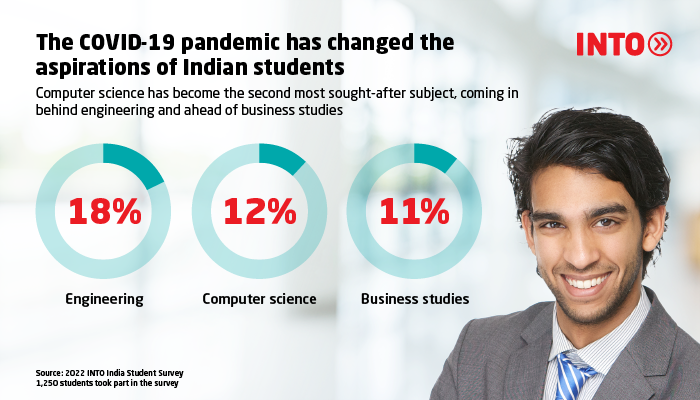India, 9th March 2022: Computer science has emerged as the second most preferred subject for Indian students looking to study abroad, an India survey by INTO University Partnerships reveals. In total, 12% of both millennial and Gen Z students say they are interested in computer science — second only to engineering (18%) and ahead of business studies (11%).

Over 1,250 Indian students took part in the survey commissioned by INTO to highlight how the pandemic has influenced their career aspirations and led to a rise of interest in subjects such as advanced technologies, health-related studies and climate change. According to the survey, over 78% of students say the pandemic has influenced their decision on which subject to pursue abroad. Specifically, 24% are more interested in advanced technologies, such as robotics and artificial intelligence (AI), 17% in health care and 16% in environment and climate change.

As per the Dell Technologies Digital Transformation Index (DT Index) 2020, 94.7% of the organisations in India had fast-tracked digital transformation projects across sectors due to the pandemic, and the rising interest in learning advanced technologies is a testament to that.
“Fuelled by the ‘Digital India Mission’, the government is increasingly injecting opportunities across sectors to implement advanced technologies,” said Mr. Diwakar Chandiok, Recruitment Director, South Asia, INTO University Partnerships. “The integration of emerging technologies such as AI and blockchain in multiple fields will have tremendous benefits for India’s economic growth. Studying abroad enables students to become global citizens and get visibility on the technologies and methodologies deployed by other countries, which can help foster growth in India.

“As per a 2021 global survey by INTO, over 45% of Indian students showcased their interest in becoming entrepreneurs. Changing aspirations combined with increased student interest in computer science signifies a very positive trend for several sectors in the country”, added Mr. Chandiok.
Indians remain upbeat as they explore new options amid COVID-19, and international education tops their list of priorities. According to data from the Ministry of External Affairs (MEA), over 2.6 lakh students studied abroad in 2020 despite the soaring pandemic and over 5 lakh students in 2019. According to INTO’s India survey, students’ primary motivation to study abroad is better quality education and skills provided by institutions abroad (22%), followed by the belief that studying abroad will increase the possibility of living in the host country post-study (11%). Similarly, students cite improved job prospects as a primary reason for studying abroad (11%).

Additionally, the survey revealed that the US continues to be the top destination for Indian students (31%), followed by Canada (23%) and the UK (17%). A sizable proportion of students are also considering institutions in Asia (12%), looking at these countries’ proximity and economic return. Australia and New Zealand saw a reduced student interest in the last two years due to border closures and travel restrictions. However, the recent reopening of borders may soon cause these numbers to rise.
The findings also reveal that 35% of students choose a country as their study destination based on the job prospects in that country, signifying the critical importance of career success and a strong return on investment in their study abroad decision-making. Meanwhile, 33% of students choose their destination country for its higher quality of education, and 32% prefer it to get the right study experience, exposure and expertise for the field they want to pursue.

Indian students are more likely than students from China to look at an immigration pathway. Moreover, whilst India is typically seen as a price-sensitive market, affordability is not among the top factors Indian students consider when selecting a study abroad destination. By this, one can easily infer that Indian students are likely to invest in education if they feel that the long-term benefits are worth it.
“Studying abroad gives students experiences that translate to many contexts and enable them to become global citizens”, said Olivia Streatfeild, CEO of INTO University Partnerships. “International exposure allows students to learn and bring back new skills, language, cultural intelligence and diversity, which eventually helps in expanding their portfolio and staying at par with their global counterparts. Our survey findings indicate that Indian students today are outcome-oriented, with the aim of gaining the right skills, living in another country, meeting new people and leveraging global opportunities.”
Here are the summarized findings of the survey:
- 12% of Indian students say they are interested in studying computer science, coming in second behind engineering (18%) and ahead of business studies (11%).
- 78% of Indian students say the pandemic has influenced the subjects they are interested in pursuing, with 24% reporting greater interest in subjects related to advanced technologies such as robotics and AI, 17% in health-related topics and 16% in subjects related to the environment and climate change.
- For Indian students, the US is the top study abroad destination (31%), with Canada (23%) and the UK (17%) following closely in second and third place. A sizable proportion is also considering universities in Asia (12%). Australia and New Zealand have seen reduced interest since the pandemic, with 8% and 5% of students aiming to go to these countries, respectively.
- Job prospects’ is the top reason for students to pick a country as their study destination (35%), followed by quality of education (33%) and correct exposure in expertise (32%).
- Better quality education and gaining the right skills are the primary reasons students aspire to study abroad (22%), followed by students wanting to experience living abroad and meeting new people (12%). 10% of students also seek to study overseas because they want to pursue new-age courses, such as data science, cybersecurity, eco-technology, urban planning, etc.
























Add comment